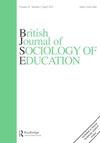抢占先机:资本继承与芬兰商科毕业生进入劳动力市场
IF 2.1
3区 教育学
Q1 EDUCATION & EDUCATIONAL RESEARCH
引用次数: 1
摘要
以往的研究将高等教育的参与与中产阶级优势的形成联系起来。研究表明,家庭背景富裕的毕业生比家庭背景不富裕的同龄人获得更多的优势,并获得更好的工作机会。利用布尔迪乌斯框架,本研究使用定性访谈数据(n = 29)来研究最近的商业毕业生如何动员经济、文化和社会资本进入芬兰劳动力市场。芬兰福利社会的背景为研究不同形式的资本继承带来了新的见解。我们的研究结果表明,虽然中产阶级学生在进入毕业生劳动力市场方面确实有一个良好的开端,但芬兰社会和高等教育系统平衡了毕业生就业中的社会不平等,因为工人阶级学生可以利用制度资源,与同龄人交往,积累工作经验来跨越结构和性格障碍。本文章由计算机程序翻译,如有差异,请以英文原文为准。
Getting a head start: capital inheritance and the labour market entry of Finnish business graduates
Abstract Previous studies have associated participation in higher education with the formation of middle-class advantages. Studies have shown that graduates from affluent family backgrounds gain more advantages from graduate degrees and secure better job opportunities than their less privileged counterparts. Drawing on the Bourdieusian framework, this study uses qualitative interview data (n = 29) to examine how recent business graduates mobilise economic, cultural and social capital for their entry into the Finnish labour market. The context of the Finnish welfare society brings novel insights to research on the inheritance of different forms of capital. Our findings reveal that although middle-class students do have a head start in entry to the graduate labour market, the Finnish society and higher education system even out social inequalities in graduate employment as working-class students may utilise institutional resources, socialise with peers and accumulate work experience to cross structural and dispositional barriers.
求助全文
通过发布文献求助,成功后即可免费获取论文全文。
去求助
来源期刊
CiteScore
3.70
自引率
9.50%
发文量
74
期刊介绍:
British Journal of Sociology of Education is one of the most renowned international scholarly journals in the field. The journal publishes high quality original, theoretically informed analyses of the relationship between education and society, and has an outstanding record of addressing major global debates about the social significance and impact of educational policy, provision, processes and practice in many countries around the world. The journal engages with a diverse range of contemporary and emergent social theories along with a wide range of methodological approaches. Articles investigate the discursive politics of education, social stratification and mobility, the social dimensions of all aspects of pedagogy and the curriculum, and the experiences of all those involved, from the most privileged to the most disadvantaged. The vitality of the journal is sustained by its commitment to offer independent, critical evaluations of the ways in which education interfaces with local, national, regional and global developments, contexts and agendas in all phases of formal and informal education. Contributions are expected to take into account the wide international readership of British Journal of Sociology of Education, and exhibit knowledge of previously published articles in the field. Submissions should be well located within sociological theory, and should not only be rigorous and reflexive methodologically, but also offer original insights to educational problems and or perspectives.

 求助内容:
求助内容: 应助结果提醒方式:
应助结果提醒方式:


